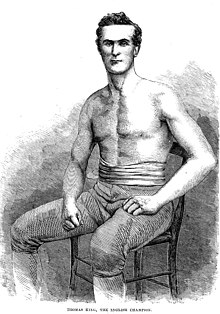Thomas King (boxer)

Tom King (born: 14 August 1835 died: 3 October 1888) also known as "The Fighting Sailor" was an English boxer who fought both bare-knuckle and with gloves.[1] Strong, fast, and durable he was a skilled pugilist. He retired from the ring in 1863, as the Heavyweight Champion of England, following his defeat of the boxer Jem Mace. In retirement he became a successful bookmaker, and married the daughter of a wealthy shipping magnate and acquired great wealth.[2]
Early life
King was born in Silver Street, Stepney East London and at an early age joined the Royal Navy, in the service he learnt to box, both with and without gloves. Retiring from the navy while still a young man he became a docker, where his skills with his fists earned him respect and some limited notoriety, following several brawls with colleagues.
Boxing career

King's brawling bought him to the attention of the retired boxing champion Jem Ward who began to give him serious pugilistic training. At this time prize-fighting was illegal in England, and likely to be broken up by the police with ensuing arrests. Matches were arranged by word of mouth and often held on remote farms, the venue being abruptly changed at short notice. However the illegality of the sport did not stop matches being well attended by members of all classes from dockers to the highest echelons of the aristocracy.
King's first professional victory was over Bill Clamp, a celebrated dockyard fighter. Two quick successive victories over Tom Truckle and Young Broome led to his first attempt to attain the English heavyweight crown from Jem Mace in 1862. The bout lasted for 43 rounds for the first 30 rounds King seemed in control. However, experience began to tell and Mace finally in spite of being almost blinded in both eyes finished King with a crushing blow to the throat.
Mace and King met for a rematch less than a year later in 1863, on this occasion King defeated Mace in the 21st round, victory was achieved by a simple punch to the face. Mace conceded and King finally obtained the heavyweight crown.
The next great fight was 20 December 1863 for £2000 against John C Heenan, the American fighter who had fought the celebrated British boxer Thomas Sayers to a controversial draw for the heavyweight title in 1860. Following the draw Heenan had been unofficially acclaimed the heavyweight champion, so the defence of this title against Heenan was an important march in English boxing. Thomas Sayers himself acted as Heenan's second in this match, the last time the legendary pugilist entered a boxing ring before his early death in 1865.[3] The bout was held at Cockmounts Farm, Wadhurst, East Sussex.[4] The fight lasted 35 minutes and 25 rounds. For the first 17 rounds the fighting appeared even, but in the 18th round King seemed to gain the advantage. In the 19th round Heenan, however, knocked King down, arguably knocking him out, but supporters of King broke into the ring. In the two minutes it took to clear the ring, King was able to regain his senses and went on to deliver a convincing defeat of Heenan.[5] Adding to the controversy, Heenan later claimed that his performance was poor because his water had been drugged when King’s supporters broke the ring, although this claim was only made some time after the fight.[6]
King now became very selective of his opponent refusing to meet Mace in the ring again. Mace was furious at not being given the opportunity to regain his heavyweight title, and in order to prompt a fight deliberately set out to pick a fight with King in the street [7] but King still refused to fight him and retired allowing the heavyweight title to fall vacant though many unofficially claimed it.[8]
Retirement
Having defended and retained the heavyweight title, King retired. Unlike many of his contemporaries who relied on the charity and munificence of their former patrons and fans for support after their lives in the ring, King went on to make a fortune as a successful bookmaker. In later life he became a celebrated rower, and married the daughter of a wealthy ship owner. He died on 4 October 1888 at his home Clarence House, Clapham, London aged 53. He is buried at West Norwood Cemetery, London.[9]
Notes
- ^ cyberboxingzone.
- ^ Boxing Hall of Fame
- ^ Kungfu Magazine
- ^ Heenan directory
- ^ Fox, Richard C. 1881. John C. Heenan of Troy, N.Y., Champion Pugilist of America: His Life and Battles, with Portraits and Illustrations. New York: Police Gazette., pp. 48–49
- ^ Ryczek, William J. 209. Baseball’s First Inning: A History of the National Pastime Through the Civil War. Jefferson, NC: McFarland & Co., pp. 91–92
- ^ [1] Biography of Jem Mace
- ^ Mace finally regained the title in 1866, in a victory over Joe Goss and held it until his own retirement in 1871. Mace became the last undisputed heavyweight champion recognized under the London Prize Ring rules. The Queensbury rules written in 1865 enforcing boxing with gloves came into being.
- ^ BBC report: West Norwood Cemetery
References
- Seccombe, Thomas (1901). . In Lee, Sidney (ed.). Dictionary of National Biography (1st supplement). London: Smith, Elder & Co.
- Thomas Seccombe, King, Thomas (1835–1888) rev. Julian Lock, Oxford Dictionary of National Biography, 2004 (subscription required)
